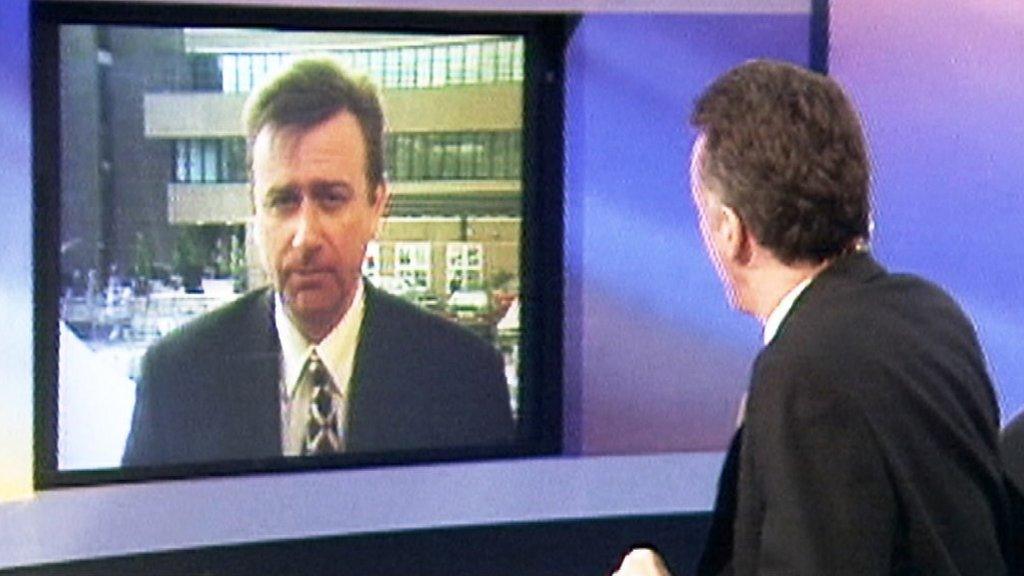Stephen Grimason: Ex-BBC political editor who broke Good Friday deal dies
- Published
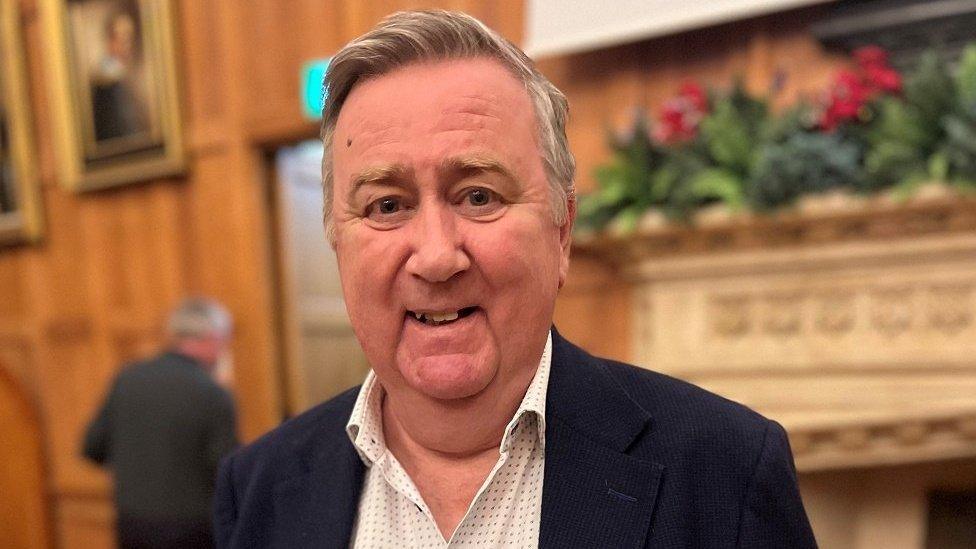
The former BBC News NI political editor Stephen Grimason, who broke the news of the 1998 Good Friday Agreement, has died aged 67 after a long illness.
Across three decades in journalism, Mr Grimason's career saw him report on some of the darkest, most notorious moments of Northern Ireland's Troubles.
But he is possibly best known for his reporting of the peace deal which helped to end the Troubles.
"I have it in my hand," he declared on television, while holding the document.
Three years later, he left the BBC to work for the devolved power-sharing executive that was created by the agreement.
He became Stormont's director of communications - a role he held until 2016, more than 40 years after he first embarked on a career as a journalist.
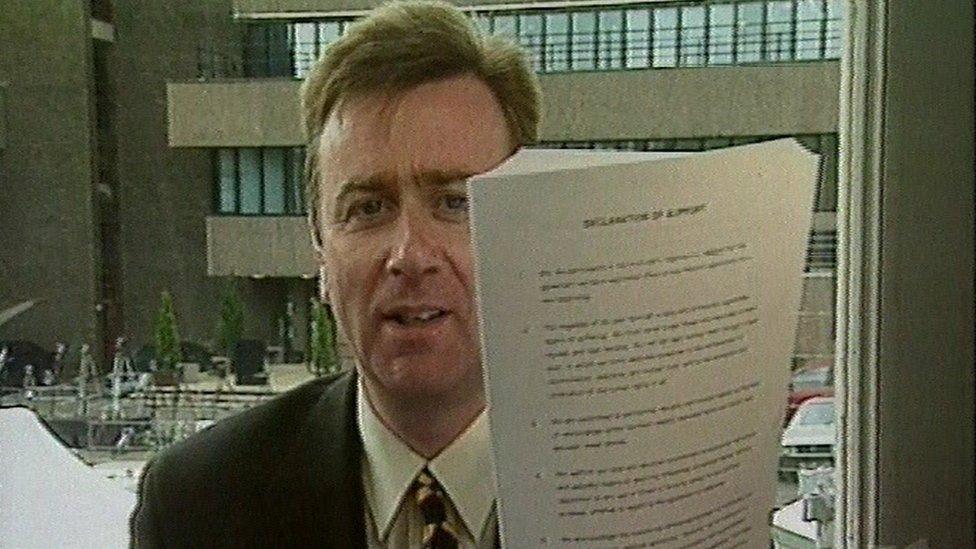
Stephen Grimason holding a copy of the Good Friday Agreement in April 1998
Paying tribute to Mr Grimason, Adam Smyth, the director of BBC Northern Ireland, said: "Stephen Grimason possessed the special talents that only the very best editors and correspondents exhibit - the audience always came away from his broadcasts feeling they knew and understood the political landscape better and they trusted what he had to say.
"Stephen's list of contacts and sources was so extensive he regularly seemed to be one step ahead of everyone else - including the politicians.
"His contribution to BBC Northern Ireland is deeply appreciated and we offer our sincerest condolences to Stephen's family."
'I have it in my hand'
Mr Grimason was described as a "brilliant political editor" by former BBC News NI presenter Noel Thompson.
"He had the two most important attributes for the job. He loved the gossip - the inside track - and he loved to share it with the rest of us," he said.
"His biggest scoop was of course getting hold of a copy of the Good Friday Agreement before any of the hundreds of other journalists camped out at Stormont.
"'I have it in my hand' he told me live on air, with justifiable pride and excitement. It's one of the key journalistic moments of the last 30 or 40 years."
Former BBC Political Editor Stephen Grimason recalls breaking the news of a deal on Good Friday.
A friend and long-time BBC colleague of Mr Grimason, Brian Rowan, remembered him "not just for the big stories, but for his courage to stand up to editors and to politicians, and to stand up for colleagues and for what was right".
The former BBC News NI security editor added that Mr Grimason was an inspiration during his illness, when he "worried more about others than himself".
"He told a few of us recently that you don't fight cancer, you cope with it. And I will remember always how brilliantly he coped," he said.
"There is a lot of remembering in the 40-plus years I knew Stephen; his wit, his lines but, most of all, having spent some time chatting with him in recent months, his strength in how he carried not just himself, but all those around him."
Early days in journalism
Mr Grimason was born in Lurgan, County Armagh, in 1957, and it was at school that his journalistic potential was first noticed.
Speaking in an interview with BBC Talkback in 2022, he said some teachers were "pushing me in this direction because they were saying you can write pretty well". They also told him he was "nosy" and was "always causing trouble".
He entered journalism in 1975, joining the Lurgan Mail before moving to the Ulster Star in Lisburn where he combined news reporting with his role as sports editor.
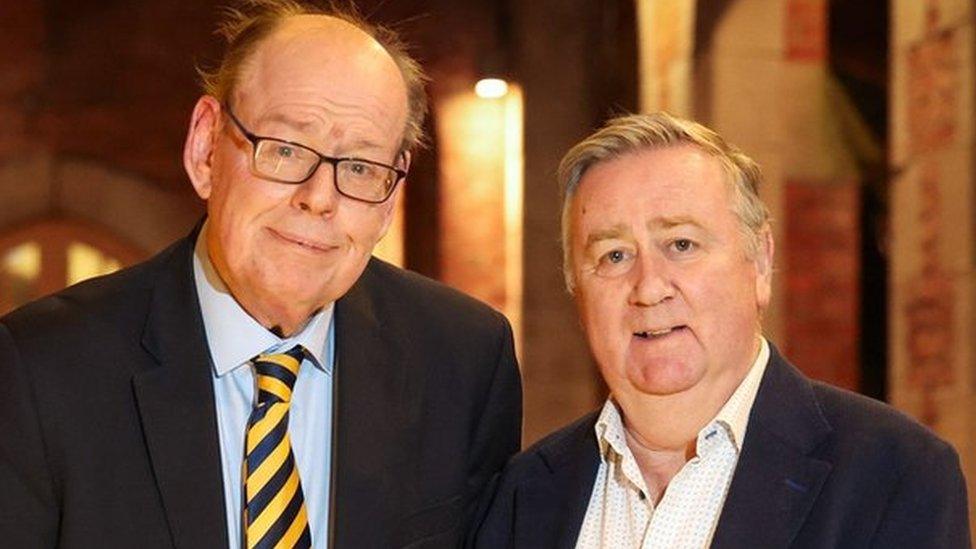
Former UTV political editor Ken Reid and former BBC NI political editor Stephen Grimason were honoured by Queen's University Belfast in January
At just 27 years old, he became editor of the Banbridge Chronicle. Later, after 12 years in newspaper journalism, he applied for a job at the BBC in Northern Ireland.
"There were something like 300 of us (who applied) and two of us got jobs - so I must have bluffed my way rightly," he said of that time.
Recalling the affect of the Troubles on journalists, who had to regularly cover killings and bombings, he said many had to see "things they shouldn't have seen and still have issues with".
"I think that ultimately journalists got through the Troubles on a diet of black humour and alcohol," he added.
Breaking news of the Good Friday Agreement
Remembering the moment he was able to reveal Northern Ireland's peace deal to the world, Mr Grimason said it came after a long week on minimum sleep.
"Ultimately I was passed - just outside the BBC's office - a brown envelope, which I have to this day, containing the document," he said.
"There'd been a great deal of talk in that week's run up - George Mitchell (the US co-chair of the all-party talks) had appealed to journalists not to run it if it was leaked to them. And the BBC quietly asked me what would I do if I got it.
"I said if they give it to me, it's because they want it out and if I don't put it out, they're going to give it to somebody else - so it's going out.
"And I think this was given to me as a means of pushing some of the doubters in the Ulster Unionist Party over the line."
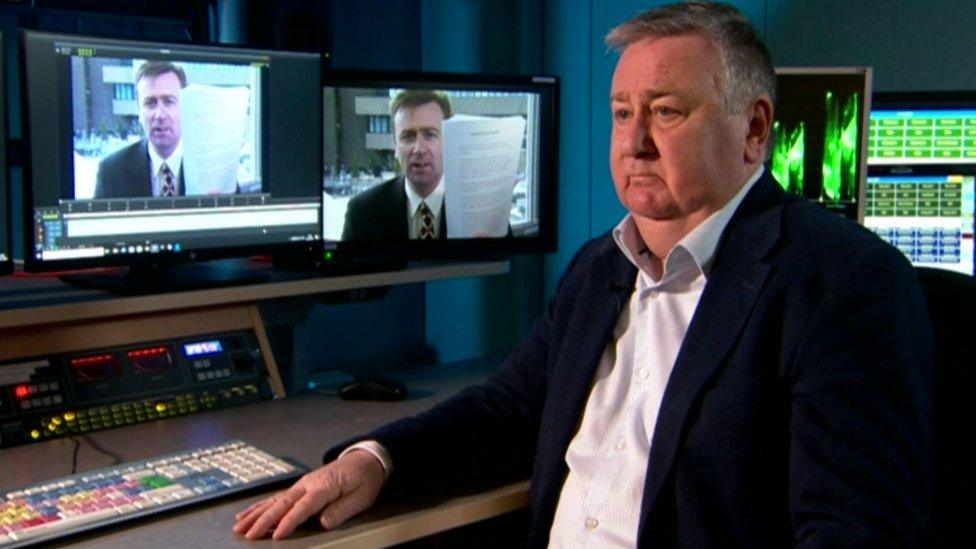
Stephen returned to the BBC for the 25th anniversary of the signing of the Good Friday Agreement
Mr Rowan, who worked closely with Mr Grimason at the time of the deal, said he was "still chewing the hat I told him I would eat if there was political agreement in '98".
"He was right, of course, I was wrong."
Mr Rowan added: "He was great at one-liners. He always refused to say how he got that leaked copy of the Good Friday Agreement, reminding us that a source is not just for Christmas, or I suppose, Easter in this case."
Reflecting on the relationship between journalists and politicians, Mr Grimason told Talkback someone once described it as akin to that of a dog and a lamppost.
"And the only really, really curious question about it was which one's which - and that these roles could switch."
Ken Reid, former UTV political editor said Mr Grimason was "a true inspiration in the way he tackled his disease.
"He was brave to the end. A great friend with many talents," Mr Reid said.
"We first worked together over 40 years ago and even though we were rivals for many years there was never a cross word between us.
"He never lost his sense of humour and I'll miss him terribly."
A new role at Stormont
In 2001, Mr Grimason left the BBC to become Stormont's new director of communications, a role he held until 2016.
He fiercely protected his impartiality among warring factions around the Northern Ireland Executive table, telling Talkback that he once borrowed a line from the sitcom Porridge: "I remember once saying to almost the entire executive that I didn't take sides and I treat them all with equal contempt."
After leaving his communications role, Mr Grimason contributed to the debate on events at Stormont as a political commentator.
He suffered a blow in 2022, when his younger brother Darryl, who was also a BBC journalist and presenter, passed away.
Earlier this year, along with former UTV political editor Ken Reid, he was awarded the Queen's University Belfast Chancellor's Medal.
They were praised for their remarkable contribution and for providing "a vital public service during the dark days of fear and uncertainty".
Away from work, he was an avid golfer and a keen rugby and football fan, passionate about Chelsea FC.
However he suffered poor health in recent years, telling Talkback in 2022 that he was reaching "the terminus of my life".
"I've lost both my kidneys to kidney cancer, I am terminally ill but what am I going to do, sit and cry about it?
"Get on with your life, stop moaning. I'll have what time is left to me and it's probably months rather than years, but look at the life I've had."
Saying he had "loved every disgusting minute of it", he added: "Life is what you make it and I've worked very hard over the years to make it what it is for me and I'm very happy."
Related topics
- Published26 January 2024
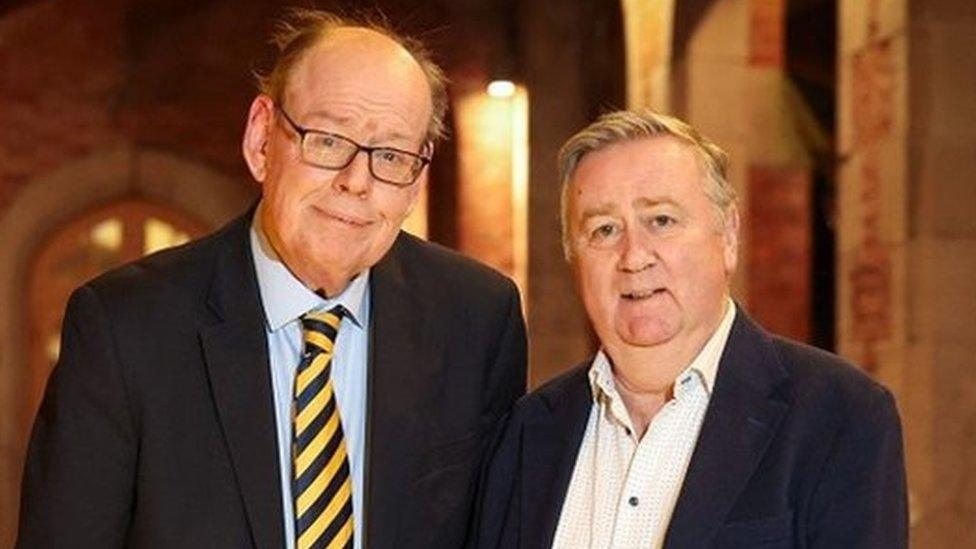
- Published7 April 2023
